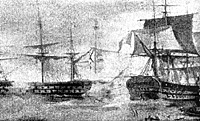Early in 1828, Vice Admiral Sir Edward Codrington was recalled to London to explain his conduct as Commander of the British Eastern Mediterranean Fleet. The particular event that concerned the British Government was a naval battle that took place off the west coast of Greece.
 The Azov and Breslau engaging Turkish Ship of the Line.
The Azov and Breslau engaging Turkish Ship of the Line.
In this battle, the Allied Fleet that Codrington led completely destroyed the Egyptian-Turkish Fleet. The complication was that Great Britain was not at war and had no intention of going to war with the either Egypt or the Turkish Empire.
Greek War of Independence
To understand how a competent British Naval officer could find himself engaged in a battle with ships of a nominally friendly power, one has to look at the context of the engagement. The circumstances that surrounded the battle are commonly referred to as the Greek War of Independence (1821 - 1829). This war was a very nasty guerrilla war which oscillated between Greek and Turkish dominance. Atrocities were common place on both sides, with Greeks, vigorously slaughtering each other as well as the Turk. Additionally, the Greek "naval" forces tended to treat any vessel trading with the Turks (Turk, British, French, etc) as enemy. As a result, the Greek navy activity was very much viewed as pirates.
European Reaction
The Greek rebellion caused great consternation among the Great European Powers (Russia, Austria, Prussia, France & Britain). Austria and Prussia want to preserve the status quo and thereby supported the Ottoman Empire. Russia wanted to use the rebellion to strike at Turkey. Britain and France were split: Popular opinion favored the Greeks but government wanting to preserve a bulwark against Russian expansion leaned towards the Turks.
As the war comtinued, popular pressure on the British and French governments increased as the image of helpless Christians being massacred by heartless Turks was invoked by the press.
Early in 1827, Russia, Britain and France signed the Treaty of London. This agreement publicly committed the signatories to the secure of Greek autonomy. It secretly provided for a 'pacific blockade' of Greece.
In order to prevent the Ottoman Navies (Turkish & Egyptian) from using their naval superiority to advance their cause. As the name 'pacific blockade' implies, this blockade was to be perform without the use of force.
Naval Situation in Eastern Mediterranean - 1827
The British and French Eastern Mediterranean squadrons in early 1827 were designed to protect British and French shipping not to overawe the Sultan's naval force. They contain primarily cruiser type ships i.e. frigates, corvettes, brigs and schooners. Admiral Cordington's British force had but 1 ship of the line, his flagship Asia. Admiral De Rigny's French ships consisted only of frigates and smaller ships
Therefore, in order to fulfill their parts of the Treaty of London, France and Britain reinforced their existing squadrons. The Russian having no ships in the Eastern Mediterranean had to outfit a new squadron in the Baltic for service in Greek waters.
The British squadron under Admiral Codrington was to receive two ships of the line, Albion and Genoa. Three ships of the line, Trident, Breslau, and Scipion reinforced the French squadron.
The newly readied Russian squadron under the British trained Dutchman Admiral de Heiden contained 4 ships of the line, Azov(Flagship), Gauguat, Ezekiel, Alexander Nevsky and 4 frigates. These reinforcements arrived piecemeal and in the meantime, the British and French squadrons continue to operate independently of each other.
On the Ottoman side, the naval situations evolved around supporting land operations in Morea (the Pelapponese.) The naval forces performing this support mission actually consisted of two navies; the Turkish Fleet of the Sultan in Constantinople and the Egyptian Fleet of his very independently minded Viceroy of Egypt.
The combat record of the Sultan navy up to this point in the war was not enviable. It had lost a number of warships including two of her irreplacable ships of the line and transports to Greek fireships. At various points in the war, the Turks were to withdraw the navy from the Aegean for fear of Greek fireship attack.
This situation changed when Ibrahim Pasha's Egyptian forces arrived in 1825. The Egyptian military, with the aid of the French, was in the process of modernization.
Her navy although primarily a frigate fleet was much more professional than the Turk's. This professionalism and the use of the larger Turkish force allowed the Ottomans to achieve naval dominance around Greece.
With this naval superiority and the Egyptian army, Ibrahim Pasha reversed the prior gains of the Greek rebels.
More Battle of Navarino 1827
-
Navarino 1827: Introduction
Navarino 1827: The Battle
Navarino 1827: Map (Position after 1600 hrs) [81K]
Back to Clash of Empires No. 5/6 Table of Contents
Back to Clash of Empires List of Issues
Back to Master Magazine List
© Copyright 1999 by Keith Frye
This article appears in MagWeb (Magazine Web) on the Internet World Wide Web.
Other military history articles and gaming articles are available at http://www.magweb.com